When Coal Companies Fail to Repair the Damage, Nearby Residents Bear the Burden
Dan Radmacher | March 3, 2022 | 3 Comments
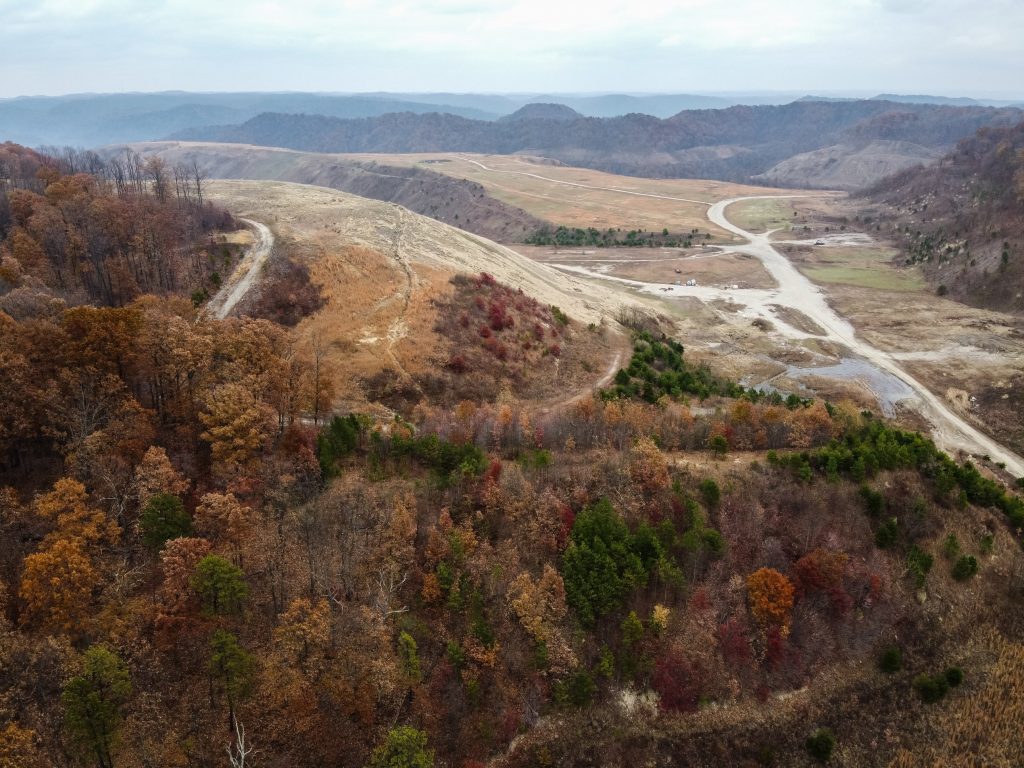
A 2019 aerial view of an unreclaimed Revelation Energy Mine, now owned by Keystone West Virginia LLC, near Kanawha State Forest in West Virginia. Revelation Energy, a sister company to Blackjewel, declared bankruptcy in 2019. Photo by Chad Cordell
By Dan Radmacher
The bankruptcy of Blackjewel, LLC, and its affiliates was, on its own, a very momentous event in the coal industry. Once the sixth-largest coal producer in the nation, Blackjewel sent shockwaves through the industry and through coal communities from Virginia to Wyoming when it filed an early-morning emergency petition in July 2019, kicking off the bankruptcy process.
But as stunning as the Blackjewel bankruptcy was, more than two years later, the flaws it has exposed in the mine cleanup system may be even more important, according to a Sierra Club attorney.
“Blackjewel is significant for itself,” attorney Peter Morgan says. “It involved lots of permits. It affects lots of people. But its greatest significance is the way it illustrates how the [U.S. Surface Mining Control and Reclamation Act] regulatory program is totally broken and unprepared to deal with the state of decline of the coal industry.
“Blackjewel is not going to be an isolated incident. It is not an outlier, it is a bellwether.”
Blackjewel, its affiliate Revelation Energy and other affiliated companies declared bankruptcy in July 2019, immediately throwing hundreds of miners out of work — unlike previous coal company bankruptcies, Blackjewel shut down immediately and didn’t continue to operate during the proceedings. The bankruptcy also left the fate of thousands of acres of scarred and polluting land up in the air.
Reclamation is the process of fixing land damaged by surface mining. This includes getting rid of dangerous highwalls, revegetating the land and taking other steps to restore the site, minimize the pollution it generates and prevent hazards like landslides and retention pond failures.
Under the federal surface coal mining law, SMCRA, and associated regulations, companies are supposed to reclaim the land as much as possible while mining is still ongoing — essentially, mine operators are required to clean up their mess as they go.
 If a coal company that mines a site can’t clean it up, federal law requires the state mining agency to ensure reclamation is completed. States fund mine clean-up through a bonding program where money is often provided by a third-party company, known as a surety. Surety companies essentially provide reclamation insurance to state regulators, guaranteeing payment of reclamation costs in exchange for fees paid by the coal company.
If a coal company that mines a site can’t clean it up, federal law requires the state mining agency to ensure reclamation is completed. States fund mine clean-up through a bonding program where money is often provided by a third-party company, known as a surety. Surety companies essentially provide reclamation insurance to state regulators, guaranteeing payment of reclamation costs in exchange for fees paid by the coal company.
If cleanup falls to the state, the state agency is supposed to be able to reclaim the site using the coal company’s forfeited bond or money from a state bonding pool that multiple companies have contributed to.
But with the number of coal company bankruptcies rising, the system is under increasing stress, and it isn’t clear who will pay to remediate the 200 or so mining sites abandoned in the Blackjewel bankruptcy.
“If sufficient bonds aren’t available, it is likely that many of these sites will not be reclaimed,” says Erin Savage, senior program manager at Appalachian Voices, the nonprofit organization that publishes The Appalachian Voice. “As the sites decline, pollution and safety issues will increase. The costs created by these mines will fall on nearby community members and taxpayers across the impacted states, unless state or federal programs are created to provide backup funding.”
Unlike previous coal company bankruptcies, Blackjewel, Revelation Energy and their subsidiaries were unable to reorganize and emerge from bankruptcy. Instead, the companies ceased to exist at the end of 2021, after a final 90-day court deadline. Approximately 200 permits held by Blackjewel and its subsidiaries were not transferred from the bankrupt companies to others by the deadline, raising questions about the current status of those permits and who is currently responsible for maintaining the sites and addressing any problems.
Appalachian Voices released an online tool in December to help track which permits have successfully transferred and which haven’t.
Reclamation of those abandoned permits should fall to the state and be funded by the coal companies’ forfeited bonds, the state bond pool, or money from the bond surety companies that guaranteed bonds for Blackjewel, according to Morgan.
But Morgan says it doesn’t appear that Kentucky sees it that way. The state mining agency has continued to process permit transfer applications even after the transferring companies – the companies named on the permits – were dissolved. Officials from Kentucky’s Energy and Environment Cabinet did not respond to a request for an interview.
“Two problems: That’s not how SMCRA works. If you don’t have a permittee, you don’t have a permit any more,” Morgan says. “The much bigger problem, though, is that the companies that have purchased the mines but haven’t received a transferred permit have been allowed to operate them. Mines are being operated by companies that aren’t permit holders.”
That may seem like a regulatory technicality, but permits are how state and federal regulators hold mine operators accountable to ensure they are maintaining and reclaiming mine sites.
“If a landslide happens on that permit, who’s responsible?” asks Mary Cromer, deputy director of Appalachian Citizens’ Law Center, a nonprofit law firm in Eastern Kentucky that focuses on coal-related issues. “The state hasn’t taken over responsibility. The surety hasn’t taken over responsibility. Who’s responsible for daily maintenance to keep these sites safe and monitor pollution?”
The answers to these questions are important. But even when responsibility is clear, regulators haven’t done a good job of holding mining companies accountable — which, for Blackjewel mines, has made the current situation even worse.
This map shows the status of former Blackjewel mines in Kentucky, which had the highest number of Remain in Estate permits — mine permits that were not sold to any buyer. Over 29 Kentucky permits are in the Remain in Estate category.
Coal companies are required to construct and maintain ditches and ponds in order to limit the impacts of stormwater runoff on adjacent land, waterways and communities. These structures slow torrents of water during periods of heavy rain, and allow silt and rock to settle out before runoff leaves a mine’s boundaries.
Ditches and ponds are also sometimes treated with chemical agents in order to mitigate discharges of harmful heavy metals and to neutralize acidity. When mine operators fail to regularly dredge these ponds and ditches, muddy and debris-filled stormwater can rush off of mining operations, damaging ecosystems and threatening the safety of people living nearby.
“It was clear that Blackjewel had not been maintaining those permits even before it went into bankruptcy,” Morgan says. “A lot of these sites have mounting issues, particularly regarding sediment control. Sediment ponds are filling in with silt. Sediment ditches are overflowing. There have been landslides. Pollution controls aren’t being maintained.”
According to Morgan, states like Kentucky have hesitated for years to strictly enforce reclamation regulations or ensure companies put up adequate bonding out of fear the costs might force the coal companies into bankruptcy and leave the state holding the bag.
“The state wanted to avoid that outcome at all costs,” Morgan says. “Now they’re really facing the consequences. Unfortunately, states are continuing to push these consequences onto the communities that live around these sites and have to deal with these floods, landslides, pollution and all the other nasty effects of unmaintained coal mines.”
Bobby Mitchell is one person living with these consequences. He lives downhill from the Aily Branch Mine in eastern Buchanan County, Virginia. Rainwater picks up mud and debris from the mine site and drains into Dismal Creek, which runs between his home and the road. Blackjewel owned this mining complex, but, following the bankruptcy, Civil, LLC, purchased the mine in 2020 along with two others.
Residents near the Aily Branch Mine, including Mitchell, reported problems for several years before the bankruptcy, and the problems haven’t gone away since Civil took over.
“Anytime it rains, this creek gets really big really fast,” Mitchell says. “And it gets real muddy. There’s a lot of runoff coming from somewhere.”
Mitchell is concerned about more than mud.
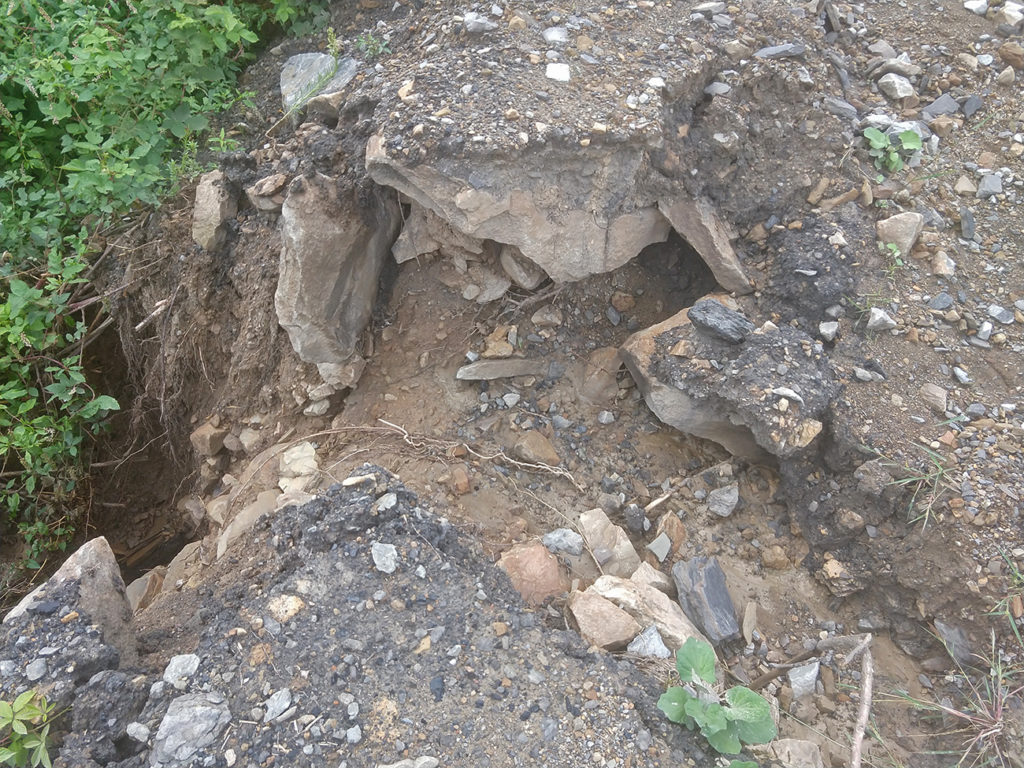
The ditches meant to contain runoff from the unreclaimed Aily Branch mine are clogged with sediment, which caused this berm to burst and send a torrent of mud and debris toward the Mitchells’ home this summer. Photo by Willie Dodson
The berms holding up those sediment ditches have failed before, sending logs and large rocks hurtling onto Mitchell’s land.
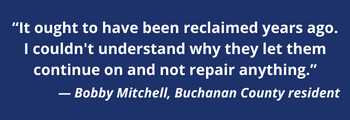 Federal mining regulations should have required ongoing efforts to restore the land, but, according to Mitchell, that clearly hasn’t been happening.
Federal mining regulations should have required ongoing efforts to restore the land, but, according to Mitchell, that clearly hasn’t been happening.
“I’ve had concerns for years about why the Department of Mines [now named Virginia Energy] let the company keep going like they did and make no repairs,” Mitchell says. “It ought to have been reclaimed years ago. I couldn’t understand why they let them continue on and not repair anything. They [Blackjewel first, now Civil] have been up there since 2011 or so and made very little repairs. I don’t understand why the state lets them do that.”
In December of 2020, Civil LLC had informed Virginia Energy that it would be suspending reclamation on Aily Branch and neighboring mines until the arrival of more favorable weather in the spring of 2021. But state inspection reports indicate that the only work that occurred onsite until at least November of 2021 was a partial effort to address an outstanding sediment control violation in July 2021.
Virginia Energy cited Civil for numerous additional violations during this time. But even though mining companies are required to reclaim disturbed land as they proceed with mining, it was more than six months after Civil suspended operations before the state issued a citation to the company for falling behind.
Typically, financially sound coal companies operate mines every month of the year. For Appalachian Voices’ Willie Dodson, who has been monitoring these developments, the situation at Aily Branch is a red flat.
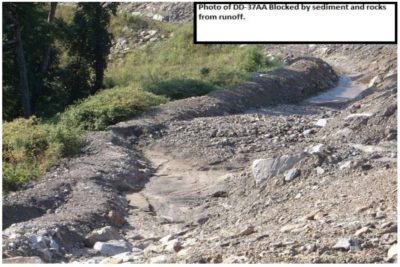
At the Aily Branch surface mine, a ditch meant to help control runoff is clogged with sediment and rocks. Image from the Virginia DMME Notice of Violation issued against Revelation Energy on Aug. 20, 2019.
In February 2022, Mitchell reported hearing machinery up the mountainside from his home, indicating that Civil LLC had resumed efforts to reclaim the 400 acres of disturbed land it obtained from Blackjewel.
In October 2020, the West Virginia Department of Environmental Protection revoked three Revelation Energy permits near Kanawha State Forest. Revelation, a Blackjewel affiliate, had made no progress in transferring the permits to other companies following its bankruptcy, and the mines had years of chronic water pollution and safety issues both under Revelation and a previous owner, Tom Scholl.
But one year later, the DEP attempted to reinstate those permits in order to transfer them back to Tom Scholl, who this time assumed the mines under the banner of Keystone West Virginia, LLC. This new enterprise is distinct on paper from Scholl’s other company, Keystone Development, which has a long history of violations — including from when it previously held these same permits before transferring them to Revelation in 2013.
Through Keystone Development, Scholl’s storied history of noncompliance also includes years of ongoing violations on the adjacent KD2 mine. The DEP forced KD2 to cease coal mining ahead of schedule and required the company to begin reclamation in 2016, after a successful campaign by Kanawha Forest Coalition to expose the mine’s impacts.
“These three permits are old permits with outstanding environmental violations that were never repaired or remedied by Mr. Scholl or his company,” says Barney Frazier, whose home sits on a ridge overlooking one of the mountaintop removal sites Keystone assumed responsibility for. “We have no faith that Mr. Scholl will properly finish the reclamation on those three permits because he never did begin to originally when they were his to correct.”
 Frazier is part of the Kanawha Forest Coalition, a local forest watchdog group that recently filed a citizen complaint with the U.S. Office of Surface Mining Reclamation Enforcement over the transfer, along with Sierra Club and Appalachian Voices. OSMRE rejected the complaint, in part because coal isn’t being actively mined at those sites.
Frazier is part of the Kanawha Forest Coalition, a local forest watchdog group that recently filed a citizen complaint with the U.S. Office of Surface Mining Reclamation Enforcement over the transfer, along with Sierra Club and Appalachian Voices. OSMRE rejected the complaint, in part because coal isn’t being actively mined at those sites.
“We’re down there fairly regularly,” says Chad Cordell, one of the founders of the Kanawha Forest Coalition. “We did a site visit with DEP a few months ago. Things have not changed very much. They were already years behind in reclamation. They’d put in a little bit of effort just to keep DEP off their backs. When the bankruptcy happened, not much changed, because not much was happening anyway. They just stopped pretending to do anything.”
Doug Wood, a board member of the Kanawha State Forest Foundation, a nonprofit organization devoted to protecting, promoting and preserving the forest, as well as a member of the Kanawha Forest Coalition, has taken part in several citizen inspections of the mine sites through the course of the ownership shifts.
Those inspections found a number of serious issues, including acid mine drainage, land slips and sedimentation.
“Since the bankruptcy, it has maintained its horrible status, in my opinion,” says Wood, who worked in water resources for the West Virginia state government for decades. “Every place we could put a sensor, conductivity [a measure of pollution in water] was high. Anytime water collected anywhere, there was acid production.”
The lack of reclamation has led to off-site impacts.
“Rush Creek carries the majority of runoff from the three Revelation permits,” Cordell says. “They’ve pretty much killed the right fork. Conductivity levels are through the roof. PH is out of whack.”
The situation reflects the failure of the entire system, according to Cordell.
“DEP could have stepped in and said we’re going to throw everything we have at Revelation until they get this work done,” he says. “Companies know they can shirk responsibilities for cleaning up these sites for as long as they can get away with it or until they’re ready to throw in the towel. Clearly, the whole system is a failure and is at or approaching a breaking point. It is a mess.”
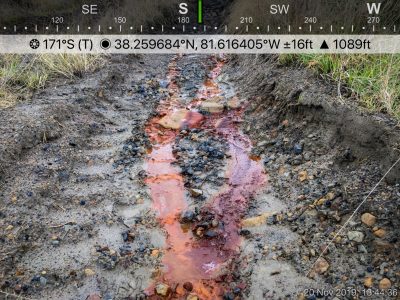
Discolored water running through a Revelation Energy mine in this 2019 photo indicates acid mine drainage. Photo by Chad Cordell
But as the coal industry continues a rapid decline, Morgan says those systems will only face greater strains.
“The overwhelming and inescapable trajectory of the coal-mining industry in the United States is downward,” he says. “There’s no reason that trend line won’t continue to go down.”
He argues that state agencies need to come to terms with that.
“What can state regulators do at this point?” asks Morgan. “They need to enforce SMCRA regulations, especially the contemporaneous reclamation regulation, so that the amount of land disturbed on a site at any given time is as small as possible. That way, when the permit is inevitably abandoned to the state, the state has the least amount of work possible required.”
The industry’s decline has exposed fundamental problems with the mine cleanup system, according to environmental advocates.
“What’s happening highlights a weakness in the way that SMCRA was written,” Morgan says. “It’s become very clear that one of the fundamental premises of the SMCRA regulatory structure is that there will always be a coal mining industry, that there will be new permits issued and new mines opening. The structure relies on that promise of new money coming into the system. It’s not prepared to deal with a situation where no new money is coming in and a rapidly increasing number of permits are being abandoned.”
In this situation, each new mine permit is a future risk.
“States need to think hard about issuing new permits that only add to the reclamation burden that will eventually fall on them,” he says.
Morgan notes that one discovery from Blackjewel’s inability to find new owners for many of its mines is that surety companies, which put up reclamation bonds, see the writing on the wall.
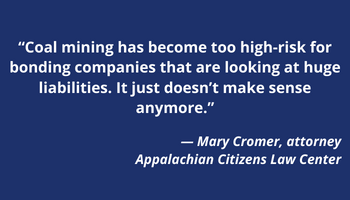 “They’re aware that if all they’re doing is paying out bonds and no one is putting money down for new bonds, well, that isn’t a sustainable business model,” Morgan says. “There are only so many bonds those companies can afford to pay out before they are at risk of bankruptcy.”
“They’re aware that if all they’re doing is paying out bonds and no one is putting money down for new bonds, well, that isn’t a sustainable business model,” Morgan says. “There are only so many bonds those companies can afford to pay out before they are at risk of bankruptcy.”
According to ACLC’s Cromer, mining companies that had expressed interest in buying Blackjewel properties testified during court hearings that surety companies’ reluctance to back new bonds played a role in why the coal companies weren’t able to move forward with permit transfers.
“The surety company was demanding 100% collateral,” Cromer says. “Coal mining has become too high-risk for bonding companies that are looking at huge liabilities. It just doesn’t make sense anymore.”
So what happens when reclamation costs are higher than the bonds and other resources available?
“It is inescapable that there is going to need to be supplemental money to pay for reclamation, likely from the federal government,” Morgan says. “In the meantime, industry and regulators have made the mess, but communities are bearing the burden and living with the impacts.”
Willie Dodson contributed to this article.
Editor’s note: On July 6, 2022, this story was edited to refer to Revelation Energy as an affiliate of Blackjewel, LLC, rather than a parent company since the companies did not have a typical parent company relationship.
Like this content? Subscribe to The Voice email digests
Great and insightful article; respectfully suggest subtitle reflect that it’s not just nearby residents who’ll bear the burden but virtually everyone at a number of political subdivisions. That it’s widespread cost-shifting away from coal company profit line onto a great many others and in a wide variety of ways.
For the technically non savvy like me ! – Can you add “share” functionality to these articles ? I’d love to share on my FB page but there does not seem to be an icon/ way to easily share the information. Thanks so much.
One possible answer or alternative is for coal companies that actually own land or have land title is to donate property for Wildlife Preserves with no hunting. They get tax breaks. redbirdband.bravehost